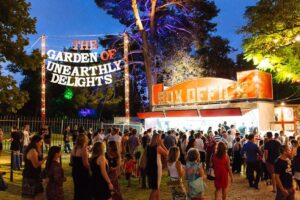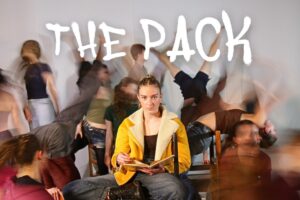Running until 28 November at the Plane Tree Centre, just outside the zoo entrance, the exhibition is free to attend and shines a spotlight on the global trafficking crisis, now recognised as the world’s fourth largest transnational crime.
Kids can help name the tortoise
To bring families closer to the issue, Adelaide Zoo is inviting visitors to vote on a name for the tortoise by scanning a QR code onsite. While the code is only available at the exhibition, the tortoise herself can be seen inside the zoo, where she has spent the past year recovering and adjusting to her new home.
Jordan O’Dea, Acting Team Supervisor of Herpetofauna at Adelaide Zoo, says the transformation has been remarkable.
“She’s a very special tortoise to us. She arrived after being confiscated over a year ago and, while it was a sad start, she’s recovered incredibly well and is now thriving,” he says.
“She’s got a big personality and it’s a privilege to care for her. African Spurred Tortoises can live for up to 100 years. We’re not exactly sure how old she is, but we estimate she’s over 10.
“This week we’re inviting the public to help name her. Come visit the Wildlife Crime in Our Backyard showcase at the Plane Tree Centre and cast your vote.”
A family-friendly look at a serious global issue
Created by the University of Adelaide’s Wildlife Crime Research Hub in partnership with Zoos SA, the exhibition gives families a powerful look at the impact of wildlife trafficking both in Australia and around the world. Through award-winning photography by Adam Oswell, research-driven infographics, and displays from organisations including Crime Stoppers SA, Taronga Zoo and Cleland Wildlife Park, visitors can learn how real animals are affected — and how everyone can help.
Professor Phill Cassey, Director of the Wildlife Crime Research Hub, says the situation is more serious than many people realise.
“Wildlife trafficking doesn’t just happen overseas. Australian parrots, reptiles and even plants and insects are being targeted by smugglers every day,” he says.
“These crimes often fly under the radar, but they are putting our ecosystems, species and security at risk. This exhibition helps shine a light on what’s happening and how the public can help.”
Why wildlife crime matters
Worth an estimated AU$32 billion, illegal wildlife trade is growing up to three times faster than the global economy. From backyard poaching to international smuggling networks, these crimes can threaten species that children love and learn about — including animals found in their own neighbourhoods.
Mark Smith, Conservation Manager at Zoos SA, says education is key.
“Wildlife crime is happening right here in our backyard, and the more people know about it, the more pressure we can put on offenders and policymakers,” he says.
“This exhibition does more than tell the story. It gives people the knowledge to recognise it, the confidence to report it, and a chance to be part of the solution. And the rescued tortoise is the perfect ambassador for that message.”
Wildlife Crime in Our Backyard is free, family-friendly, and open daily at the Plane Tree Centre until 28 November. Zoo entry is not required to access the exhibition. Voting to name the tortoise is available only onsite, so kids and parents will need to visit in person to cast their vote.






